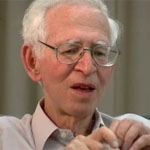Nobel Prize 1982 for his development of crystallographic electron microscopy and his structural elucidation of biologically important nucleic-acid protein complexes.
-
Videos
- Video Interviews with Scientists
- Nobel Prize Video Interviews
- Issues of Concern
- Science Video Lectures
- Reflections on Science Videos
- Masterclass Science Videos
- Science Career Videos
- Lindau 2003 Documentary
- The Next Big Thing Science Videos
- Science Video Research Projects
- Educational Resources
- Documentaries
- Art & Science Videos
- STFC Video Portal
- Women in Science
- You are here >
- Home
- Programmes
- Nobel Prize Video Interviews
- Aaron Klug - Science Video Interview
Born in Lithuania, Aaron Klug tells us about his early life and education growing up in Durban, South Africa. He developed an early interest in physiology and anatomy but did not find his teacher very inspiring and gave up classes after dissecting a kidney where the teacher clearly showed a lack of interest in the topic. Aaron went on to shape his own studies in physiology, biochemistry and what was called applicable maths. He says that there are advantages to a broad education in science, as you never know what it will lead to.
In this interview Aaron discusses in depth his research career and the work that led to his Nobel Prize. He tells us how he taught himself additional science from reading books on further mathematics and Buckminsterfuller`s theories, in addition to learning tools like Euler`s Law. He discusses the role that Buckminsterfuller`s ideas had on his work on spiracle virus structures and how he met Buckminsterfuller twice in London to make two BBC films with him. He describes his work with Rosalind Franklin during which time he worked on building x-ray sets (x-ray tubes) working in Bernal`s Department at Birkbeck College, London. He discusses the historical issues surrounding Crick and Watson and Rosalind Franklin at the time when Crick and Watson`s paper on the Double Helix was published.
On his period as President of the Royal Society he says that he regarded it as a distraction at the time from his research. He had already turned down the offer of the same position 5 years earlier as he had got involved with the MRC as head of a neuroscience laboratory but he was told that it was his duty to take on the position. So he got involved in Public and Global Policy including the Global Warming issue. While working with Whitehall he was offered a Knighthood and accepted it (feeling rather bad about it) breaking the tradition that Perutz and Sanger had set by turning it down. He was told that it would be useful in Whitehall - which he says that it was. He discusses the challenges and changes that he endeavoured to make towards the development of the management of the Royal Society.
On policy Aaron discusses the present day closure of science departments and the power of university Vice-Chancellors to re-direct funds. He also discusses the present day system of the Research Assessment Exercise (RAE) for universities.
Last but not least , on the issue of science and society he says that Global Warming and the reduction of the burning of fossil fuels is his major concern. He set up a committee on nuclear energy proposing a carbon tax and wrote on Greenhouse warming in 1990 but says that nothing has happened in the last 15 years. He says that he has been told that if the public believes it you can make the necessary changes and thinks that the evidence of Global Warming is pretty clear. He also says that both Blair (UK Prime Minister) and Kind (David King - Adviser to the Government on Science) have written about it but the opposition even from some scientists to the evidence of Global Warming is pretty strong.
Links To Other Information:








